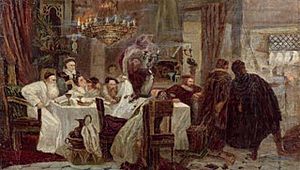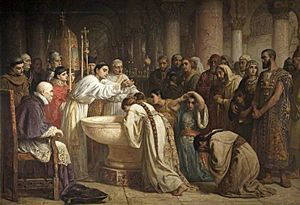New Christian facts for kids
New Christian (in Spanish: Cristiano Nuevo; in Portuguese: Cristão-Novo) was a special name and legal term used in the Spanish Empire and the Portuguese Empire. From the 1400s onwards, this term mainly described people who were descendants of Sephardic Jews and Moors (Muslims from Iberia) who had been baptized into the Catholic Church. This happened after the Alhambra Decree in 1492.
The Alhambra Decree, also known as the Edict of Expulsion, was a law against Jewish people made by the Catholic Monarchs after they finished the Reconquista (reconquest) of Spain. This law said that Jewish people had to either become Catholic or leave Spain. Most of the history of "New Christians" is about those who converted from Judaism. They were often called Conversos or, in a meaner way, Marranos. Muslim converts were known as Moriscos.
Because many people were forced to convert, especially Jewish people, the Inquisitions and the kings and queens of Spain and Portugal suspected that some "New Christians" were secretly still practicing their old religions. This was called Crypto-Judaism. So, the Spanish Inquisition and later the Portuguese Inquisition were created. Their job was to make sure everyone followed Catholic rules and to investigate if anyone was secretly practicing another faith. This became a big political issue in Spain, Portugal, and their empires, especially in the Americas.
Sometimes, "New Christians" went to places controlled by Spain's enemies, like the Dutch Empire or parts of France. There, they openly practiced Judaism. This made people even more suspicious. However, many "New Christians" from Jewish backgrounds were seen as truly Catholic by Spanish society. They even became important people in religion, like St. John of the Cross and St. Teresa of Ávila, or in politics, like Juan de Oñate.
According to António José Saraiva, a famous Portuguese historian, the idea of "Old Christian" versus "New Christian" was mostly a way for the Inquisition to categorize people. He said that being a "New Christian" was often just a formal, bureaucratic label. Sometimes, this label was based on rumors or false information. By law, the "New Christian" category included new converts and their baptized descendants up to the third generation. In Portugal, in 1772, a leader named Sebastião José de Carvalho e Melo, 1st Marquess of Pombal ended the legal difference between New Christians and Old Christians.
Contents
New Christian: A Legal Category
Even though the idea of "New Christian" doesn't make sense in Christian beliefs, it was created by "Old Christians." They claimed that their "pure" Christian family lines made them a special group, different from Jewish or Muslim people.
Old Christians wanted to legally and socially separate themselves from the conversos (converts to Christianity). They thought these converts were somehow "tainted" by their non-Spanish backgrounds. This was true even though most of Spain's Muslims were also originally from Iberia, having converted to Islam much earlier.
For New Christians of Jewish origin, the term New Christian was a legal tool that showed unfair treatment based on their background, rather than about their religion. For those of Moorish origin, it was unfair treatment based on their Berber or Arab background.
Cleanliness of Blood and Related Ideas
The idea of limpieza de sangre ("cleanliness of blood") in Spain also kept New Christians out of many parts of society. This included universities, moving to the New World, and many jobs. This happened regardless of how truly Catholic they were.
Other mean terms used for these groups included marranos (meaning "pigs") for New Christians from Jewish backgrounds. Moriscos was a term for New Christians from Andalusian (Muslim) backgrounds, and it also had a negative meaning.
Discrimination and Harsh Treatment

Being called a New Christian led to many problems. People faced social shame and were left out. They had fewer civil and political rights. There were also social and sometimes legal rules about whom they could marry. They faced restrictions on where they could live and what jobs they could have, including becoming priests. They were also often not allowed to move to or settle in the new Spanish territories in the Americas. Sometimes, they were even sent away from the colonies.
Besides these restrictions, the Spanish Crown and Church also treated New Christians very harshly. They were put on trial and sometimes even faced the death penalty for actually or supposedly practicing their family's old religion.
After the Alhambra Decree in 1492, which expelled Jewish people from Spain, and a similar law in Portugal in 1497, the remaining Jewish people in Iberia officially became Christian. New Christians, especially those from Jewish backgrounds, were always suspected of being judaizantes ("judaizers"). This meant they were thought to be secretly practicing Judaism while pretending to be Christian.
Moving Away
Jewish "New Christian" Emigration
Even with all the unfair treatment, many Jewish-origin New Christians found ways to move and settle in the Spanish and Portuguese colonies in the New World. They did this by faking or buying documents that said they had "clean blood" or by getting false statements saying they were from "Old Christian" families. Their descendants, who could not return to Judaism, became the modern-day Christian Sephardic Bnei Anusim in Latin America.
Also, because of the constant trials and harsh treatment by the Spanish Inquisition and Portuguese Inquisition, other Jewish-origin New Christians chose to leave Spain and Portugal. Between the 1600s and 1800s, many moved to Amsterdam and London. In these new, more accepting places, they eventually returned to Judaism. Their descendants are known as the Spanish and Portuguese Jews.
Muslim "New Christian" Emigration
Even though Iberian Muslims were protected by a treaty when Granada fell, and their New Christian descendants were not expelled until over a century later, many still left. Different groups of Iberian Muslims and New Christians of Moorish origin moved to North Africa and the Ottoman Empire.
History of New Christian Conversions
Spain
Throughout the Middle Ages, Sephardim (Jewish people in Iberia) and Moors (Muslims in Iberia) sometimes converted to Christianity. This usually happened because of pressure, like physical threats or social and economic difficulties.
In the 1300s, there was growing pressure, especially against Jewish people. This led to violent events in 1391 in Seville and other cities, where many Jewish people were killed. These events destroyed Jewish neighborhoods and led to many conversions. This trend continued through the 1400s.
More than 100,000 Jewish people in Spain became Catholic after the attacks in 1391. The Jewish people who still practiced their faith were expelled by the Catholic monarchs Ferdinand and Isabella in the Alhambra Decree in 1492. This happened after the Catholic Reconquest of Spain. Because of the Alhambra Decree and earlier harsh treatment, over 200,000 Jewish people converted to Catholicism, and between 40,000 and 100,000 were expelled. After the Reconquest, 200,000 of the 500,000 Muslims in Spain had been forced to convert to Christianity. At the start of the 1500s, there were about one million Moriscos (New Christians and their descendants).
Portugal
In Portugal, the idea of "New Christian" was mainly a way for the Inquisition to classify people. It was often based on rumors or false information. Jewish people had lived in Portugal even before Christianity became the official religion of the Roman Empire.
In 409, different groups invaded the Iberian Peninsula. The Visigoths, allies of the Romans, established a kingdom. Some Visigothic kings began to treat Jewish people unfairly. Later, after the invasion by the Moors in 711, the reconquest of Portugal began. Unfair treatment continued, changing over time. By the end of the 1400s, similar events to those in Spain began in Portugal.
Inquisition
The governments of Spain and Portugal created the Spanish Inquisition in 1478 and the Portuguese Inquisition (including the Goa Inquisition) in 1536. They said this was to deal with social problems and fight against false religious beliefs. People believed that many New Christians were secretly practicing their old religions, becoming crypto-Jews and crypto-Muslims.
See also
 In Spanish: Cristiano nuevo para niños
In Spanish: Cristiano nuevo para niños
- New Christian (disambiguation)
- Converso
- Crypto-Judaism
- Limpieza de sangre
- Marrano
- Old Christian
- Sephardic Bnei Anusim
 | Precious Adams |
 | Lauren Anderson |
 | Janet Collins |


